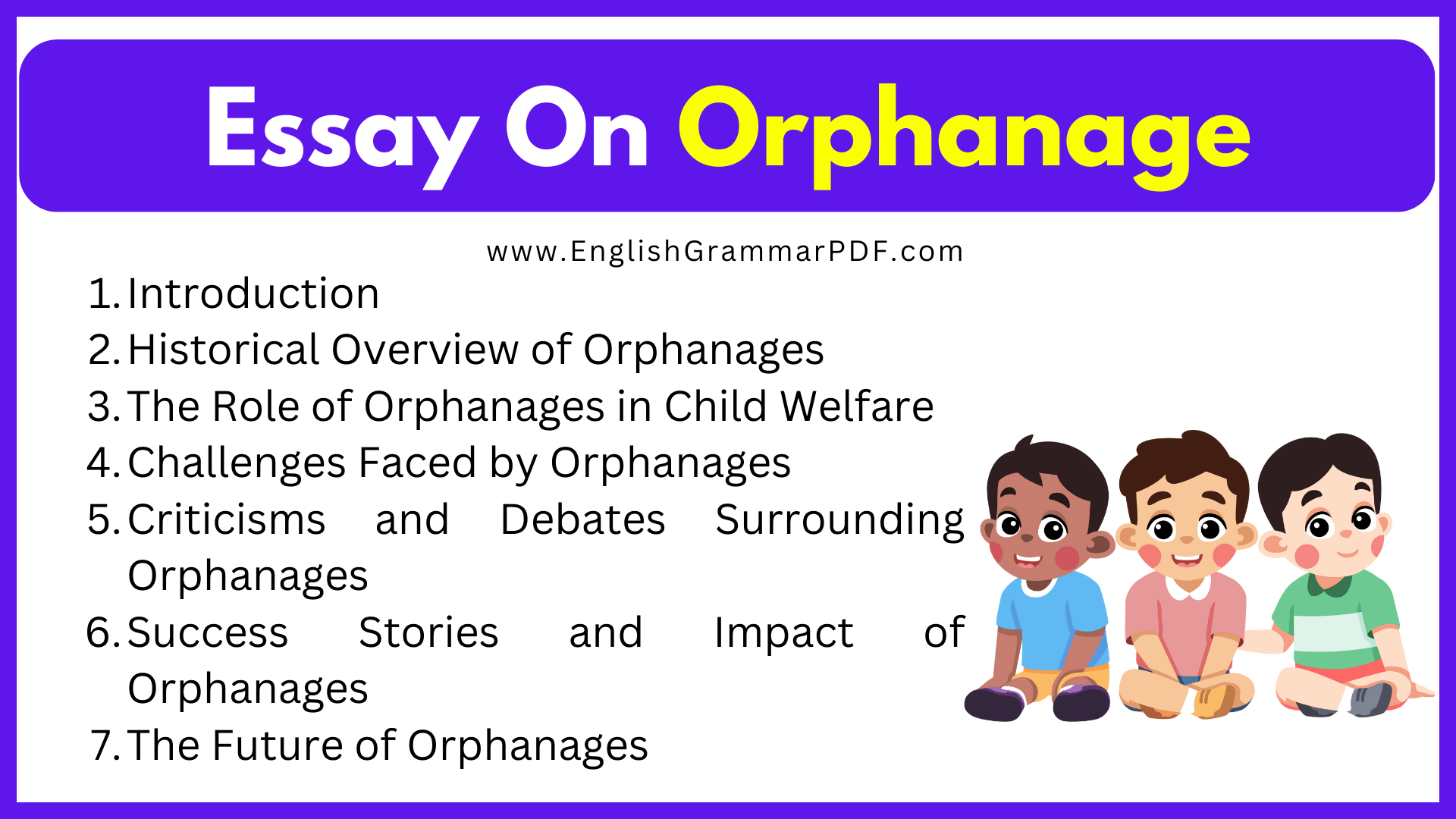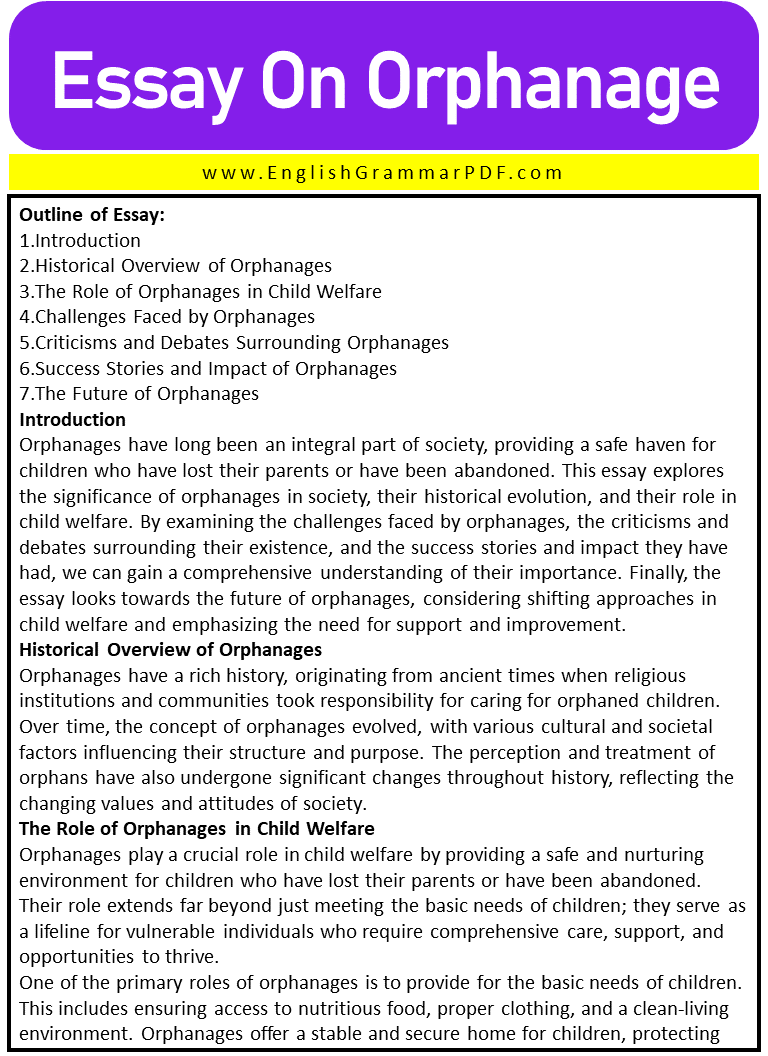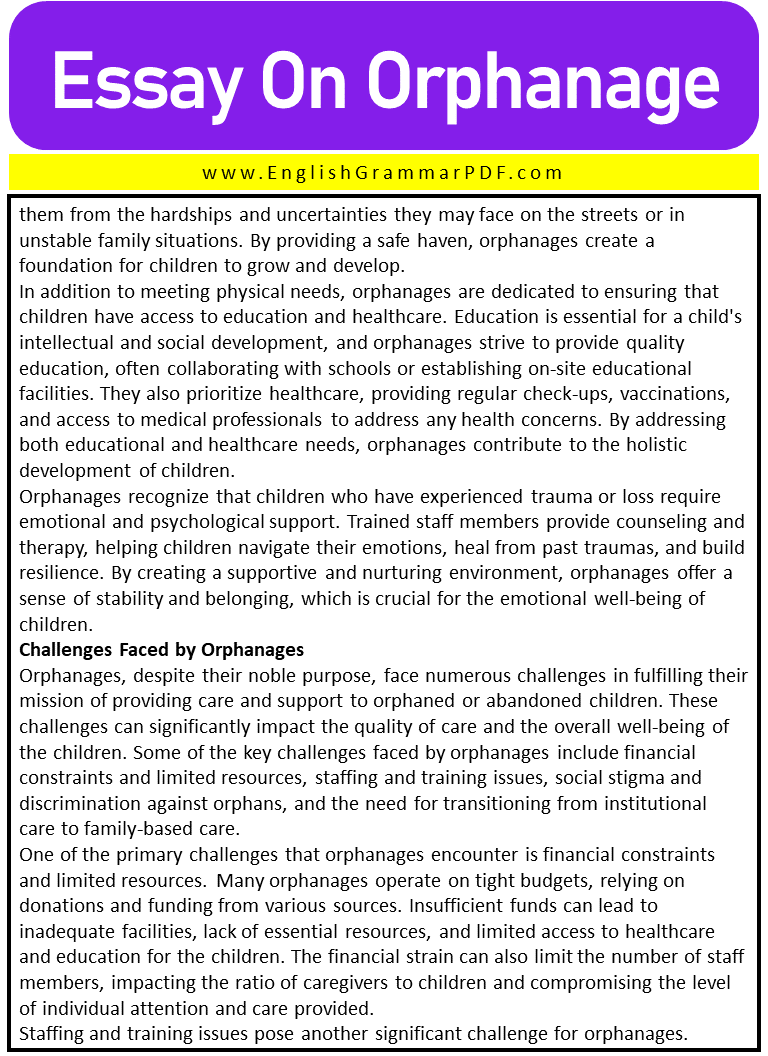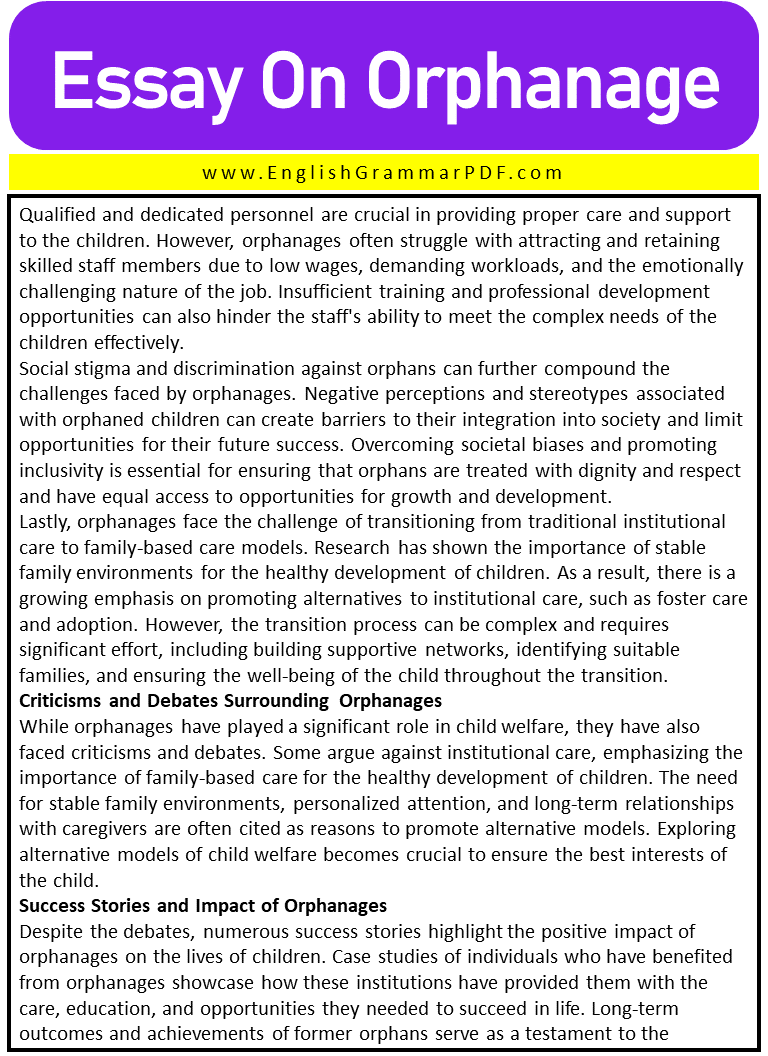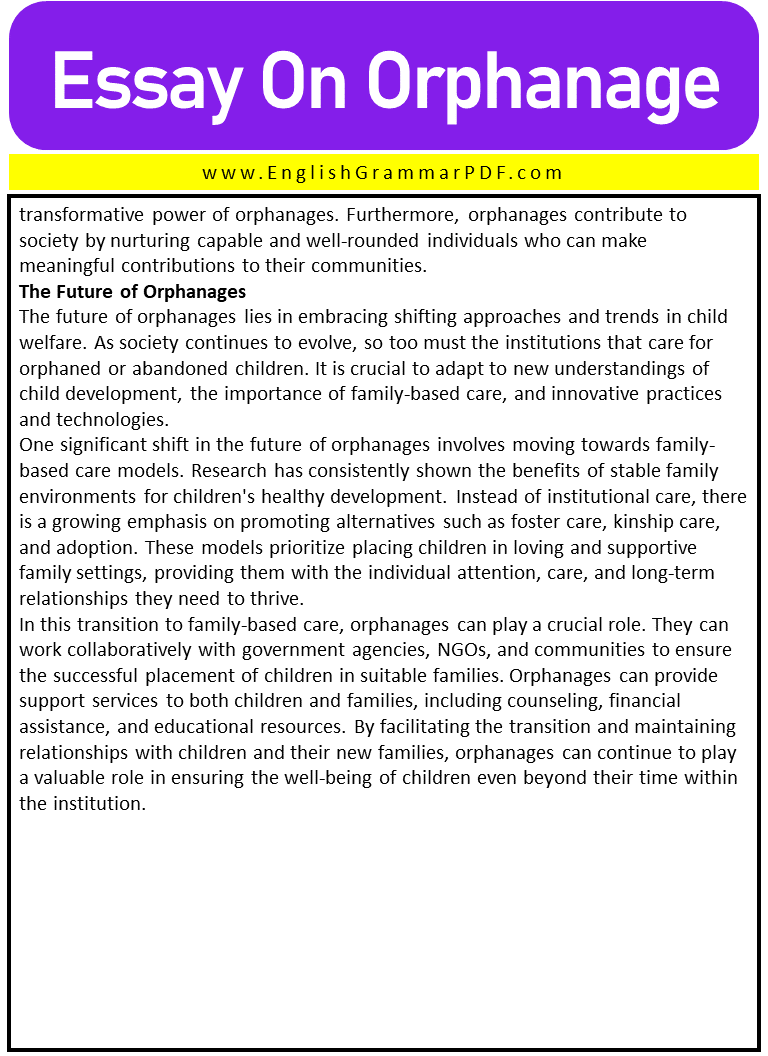Essay On Orphanage
Outline of Essay:
- Introduction
- Historical Overview of Orphanages
- The Role of Orphanages in Child Welfare
- Challenges Faced by Orphanages
- Criticisms and Debates Surrounding Orphanages
- Success Stories and Impact of Orphanages
- The Future of Orphanages
Introduction
Orphanages have long been an integral part of society, providing a safe haven for children who have lost their parents or have been abandoned. This essay explores the significance of orphanages in society, their historical evolution, and their role in child welfare. By examining the challenges faced by orphanages, the criticisms and debates surrounding their existence, and the success stories and impact they have had, we can gain a comprehensive understanding of their importance. Finally, the essay looks towards the future of orphanages, considering shifting approaches in child welfare and emphasizing the need for support and improvement.
Historical Overview of Orphanages
Orphanages have a rich history, originating from ancient times when religious institutions and communities took responsibility for caring for orphaned children. Over time, the concept of orphanages evolved, with various cultural and societal factors influencing their structure and purpose. The perception and treatment of orphans have also undergone significant changes throughout history, reflecting the changing values and attitudes of society.
The Role of Orphanages in Child Welfare
Orphanages play a crucial role in child welfare by providing a safe and nurturing environment for children who have lost their parents or have been abandoned. Their role extends far beyond just meeting the basic needs of children; they serve as a lifeline for vulnerable individuals who require comprehensive care, support, and opportunities to thrive.
One of the primary roles of orphanages is to provide for the basic needs of children. This includes ensuring access to nutritious food, proper clothing, and a clean-living environment. Orphanages offer a stable and secure home for children, protecting them from the hardships and uncertainties they may face on the streets or in unstable family situations. By providing a safe haven, orphanages create a foundation for children to grow and develop.
In addition to meeting physical needs, orphanages are dedicated to ensuring that children have access to education and healthcare. Education is essential for a child’s intellectual and social development, and orphanages strive to provide quality education, often collaborating with schools or establishing on-site educational facilities. They also prioritize healthcare, providing regular check-ups, vaccinations, and access to medical professionals to address any health concerns. By addressing both educational and healthcare needs, orphanages contribute to the holistic development of children.
Orphanages recognize that children who have experienced trauma or loss require emotional and psychological support. Trained staff members provide counseling and therapy, helping children navigate their emotions, heal from past traumas, and build resilience. By creating a supportive and nurturing environment, orphanages offer a sense of stability and belonging, which is crucial for the emotional well-being of children.
Challenges Faced by Orphanages
Orphanages, despite their noble purpose, face numerous challenges in fulfilling their mission of providing care and support to orphaned or abandoned children. These challenges can significantly impact the quality of care and the overall well-being of the children. Some of the key challenges faced by orphanages include financial constraints and limited resources, staffing and training issues, social stigma and discrimination against orphans, and the need for transitioning from institutional care to family-based care.
One of the primary challenges that orphanages encounter is financial constraints and limited resources. Many orphanages operate on tight budgets, relying on donations and funding from various sources. Insufficient funds can lead to inadequate facilities, lack of essential resources, and limited access to healthcare and education for the children. The financial strain can also limit the number of staff members, impacting the ratio of caregivers to children and compromising the level of individual attention and care provided.
Staffing and training issues pose another significant challenge for orphanages. Qualified and dedicated personnel are crucial in providing proper care and support to the children. However, orphanages often struggle with attracting and retaining skilled staff members due to low wages, demanding workloads, and the emotionally challenging nature of the job. Insufficient training and professional development opportunities can also hinder the staff’s ability to meet the complex needs of the children effectively.
Social stigma and discrimination against orphans can further compound the challenges faced by orphanages. Negative perceptions and stereotypes associated with orphaned children can create barriers to their integration into society and limit opportunities for their future success. Overcoming societal biases and promoting inclusivity is essential for ensuring that orphans are treated with dignity and respect and have equal access to opportunities for growth and development.
Lastly, orphanages face the challenge of transitioning from traditional institutional care to family-based care models. Research has shown the importance of stable family environments for the healthy development of children. As a result, there is a growing emphasis on promoting alternatives to institutional care, such as foster care and adoption. However, the transition process can be complex and requires significant effort, including building supportive networks, identifying suitable families, and ensuring the well-being of the child throughout the transition.
Criticisms and Debates Surrounding Orphanages
While orphanages have played a significant role in child welfare, they have also faced criticisms and debates. Some argue against institutional care, emphasizing the importance of family-based care for the healthy development of children. The need for stable family environments, personalized attention, and long-term relationships with caregivers are often cited as reasons to promote alternative models. Exploring alternative models of child welfare becomes crucial to ensure the best interests of the child.
Success Stories and Impact of Orphanages
Despite the debates, numerous success stories highlight the positive impact of orphanages on the lives of children. Case studies of individuals who have benefited from orphanages showcase how these institutions have provided them with the care, education, and opportunities they needed to succeed in life. Long-term outcomes and achievements of former orphans serve as a testament to the transformative power of orphanages. Furthermore, orphanages contribute to society by nurturing capable and well-rounded individuals who can make meaningful contributions to their communities.
The Future of Orphanages
The future of orphanages lies in embracing shifting approaches and trends in child welfare. As society continues to evolve, so too must the institutions that care for orphaned or abandoned children. It is crucial to adapt to new understandings of child development, the importance of family-based care, and innovative practices and technologies.
One significant shift in the future of orphanages involves moving towards family-based care models. Research has consistently shown the benefits of stable family environments for children’s healthy development. Instead of institutional care, there is a growing emphasis on promoting alternatives such as foster care, kinship care, and adoption. These models prioritize placing children in loving and supportive family settings, providing them with the individual attention, care, and long-term relationships they need to thrive.
In this transition to family-based care, orphanages can play a crucial role. They can work collaboratively with government agencies, NGOs, and communities to ensure the successful placement of children in suitable families. Orphanages can provide support services to both children and families, including counseling, financial assistance, and educational resources. By facilitating the transition and maintaining relationships with children and their new families, orphanages can continue to play a valuable role in ensuring the well-being of children even beyond their time within the institution.
Explore More Essays:
Download the PDF of Essay
